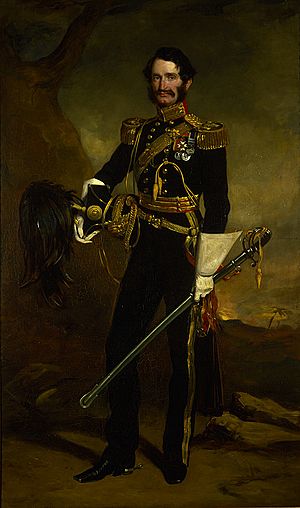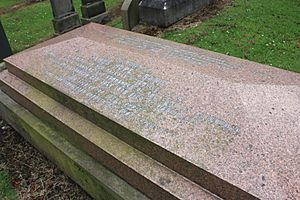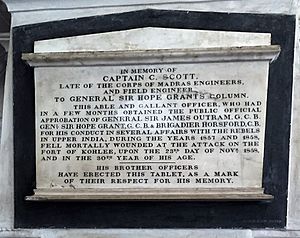Hope Grant facts for kids
Quick facts for kids
Sir Hope Grant
|
|
|---|---|

Portrait of Grant by his brother Francis Grant, 1853
|
|
| Born | 22 July 1808 |
| Died | 7 March 1875 (aged 66) London, England |
| Allegiance | |
| Service/ |
|
| Years of service | 1826–1875 |
| Rank | General |
| Commands held | Commander of British Troops in China and Hong Kong Madras Army Aldershot Division |
| Battles/wars | First Opium War First Anglo-Sikh War Indian Mutiny of 1857 Second Opium War |
| Awards | Knight Grand Cross of the Order of the Bath |
Sir James Hope Grant (born July 22, 1808, died March 7, 1875) was an important officer in the British Army. He fought in several major wars. These included the First Opium War, the First Anglo-Sikh War, the Indian Rebellion of 1857, and the Second Opium War. He was known for his skills in leading cavalry (soldiers on horseback).
Contents
Early Life
James Hope Grant was born on July 22, 1808. He was the youngest of five sons of Francis Grant. His family lived in Kilgraston, Scotland.
Military Career
James joined the British Army in 1826. He started as a junior officer in a cavalry unit called the 9th Lancers. He quickly moved up the ranks. He became a lieutenant in 1828 and a captain in 1835.
First Opium War
In 1842, James served in the First Opium War in China. He was a special assistant to Lord Saltoun. James showed great bravery during the capture of Chinkiang. Because of his actions, he was promoted to major. He also received an important award called the CB.
Wars in India
James Hope Grant also fought in the First Anglo-Sikh War (1845–1846). He took part in the Battle of Sobraon. Later, in the Punjab campaign (1848–1849), he led the 9th Lancers. He became well-known for his leadership in the Battles of Chillianwalla and Gujarat.
He was promoted to lieutenant-colonel. In 1854, he became a colonel. By 1856, he was a brigadier, leading cavalry units.
Indian Rebellion of 1857
James played a big part in stopping the Indian Rebellion of 1857. For a while, he was in charge of all the cavalry. He also led a special mobile force of soldiers on horses and on foot.
He helped a lot during the fighting around Delhi. He was also key in the final attack on the city. After Delhi was captured, he led his cavalry and horse artillery towards Cawnpore. His mission was to connect with the main British commander, Sir Colin Campbell.
James met Sir Colin Campbell near the Alambagh. Sir Colin then made James a brigadier-general. He put James in charge of the entire force. This force was on a dangerous march to Lucknow to rescue people stuck in the residency.
After the troops moved back towards Cawnpore, James helped defeat the rebel forces. He made a clever move around their rear. This helped the British win a big victory. He then chased the rebels with a fast-moving group of soldiers. He defeated them again at Serai Ghat, taking almost all their cannons.
James also helped recapture Lucknow. Soon after, he was promoted to major-general. He was then put in charge of the forces that finally brought peace to India. Before this work was finished, he was made a KCB.
Second Opium War
In 1859, James was given a new role. He became the commander of British troops in China and Hong Kong. He led the British forces in the Anglo-French expedition against China. This campaign was very quick. The goals were achieved within three months of the troops landing in China.
The Taku Forts were captured. The Chinese army was defeated three times in open battles. Finally, the city of Peking (now Beijing) was taken. For his success in this war, which was considered very well-managed, James received thanks from the British Parliament. He was also given the highest award, the GCB.
Later Life
In 1861, James was promoted to lieutenant-general. He was then appointed commander-in-chief of the Madras Army in India. This job also made him a member of the Madras Legislative Council from 1861 to 1864.
He returned to England in 1865. He became the Quartermaster-General for the army's headquarters. In 1870, he took command of the Aldershot Division. Here, he played a big role in improving how the army trained and educated its soldiers. This happened after the Franco-German War. James was largely responsible for starting annual army training exercises. In 1872, he was promoted to full general.
Sir James Hope Grant died in London on March 7, 1875. He is buried in Grange Cemetery in Edinburgh, Scotland.



